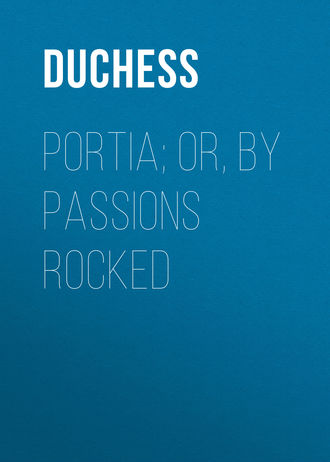 полная версия
полная версияPortia; Or, By Passions Rocked
Meanwhile, the service progresses surely, if slowly. Uncle Christopher's head is courting his chest; Fabian, who always sits next to him, is unmistakably wide-awake, but has his head lowered, and his eyes fixed moodily upon the carpet at his feet. He looks attentive, but is really miles away from the Commandments and from everything.
Portia, in her white gown, is looking more than ordinarily lovely, and just now is gazing oddly at Fabian. She is vaguely wondering how he would look if he permitted himself to smile. He is always so preternaturally grave that she is curious to know if a smile – once indulged in – would imbitter or sweeten his face. Yes; Roger was quite right when he said the other day that Fabian's face was perfect. Perhaps even the smile she desires to see upon it could not improve it. Nay, it might even mar it, so severe are its lines; but were they always so? She is lost in impossible speculation!
Dulce, clad all in severe black, with her hands crossed upon her knees, like a small devotee, is looking straight before her at nothing particular, and is utterly unconscious that the strange young man in the "Fens" pew is regarding her with an amount of attention he has certainly not expended on his prayers.
The children have behaved wonderfully well, all things considered. The Boodie has only once laughed out loud, and only twice have Jacky and Pussy indulged in a deadly scuffle; altogether, there is deep cause for thankfulness.
The cobweb is still waving to and fro, and now (as Mr. Grainger ascends the stairs and enters the pulpit), driven, perhaps, by some stronger current of air, moves rapidly to the right, so that the rector reaches his place and arranges himself therein, without coming into collision with it, to Roger's and Dicky's everlasting chagrin.
"A narrow escape," says Dicky, in a careful undertone, to Roger, who, too, has been breathlessly watching the denouement.
"Yes, just like our dismal luck," responds that young man, in an aggrieved tone. "I'd have bet anything on its catching him by the wig."
Mr. Grainger standing up, after a short and private prayer, looks as if he was making his bow to the audience, and having surveyed them leisurely for an embarrassing moment (during which the farmers' wives fidget, and look as if they would gladly inhabit their boots), he gives forth his text.
Silence ensues; the curate arranges himself in a purely ascetic attitude; the rector stamps his foot, in a preparatory sort of way, on the floor of the massive pulpit, which is as hideous as it is clumsy to the last degree. There are a few meagre little carvings all round it, suggestive of tares, and wheat, and good Samaritans, and there is an impossible donkey in the foreground. It is a very depressing pulpit, but certainly solid.
"No chance of a breakdown," says Roger, gloomily, fixing, his eye-glass in his left eye, and surveying with ill concealed disgust the unwieldy structure before him.
"You're a brave boy," returns Mr. Browne, with exaggerated admiration. "Fancy your looking for excitement here."
"It may be nearer than you think," says Roger, so meaningly, that his companion applies himself to the translating of his glance. It is fixed, and fixed on the cobweb, too, which is slowly, slowly floating towards the rector's head. It comes nearer to it, catches in a rising lock (that has elevated itself, no doubt, because of the preacher's eloquence), and lingers there, as though bent on lifting pulpit, Grainger and all to the ceiling with the next puff of wind.
Roger forgets his grievance, his ennui, everything! The situation has its charm. To his delight he finds Dicky as wrapt in the possible result as himself. The cobweb sticks fast. Mr. Grainger, lifting his hand, smooths his ear, under the mistaken impression that the ticking feeling is there, and then goes on solemnly with his discourse, which is dryer than the weather, which is saying a good deal. He moves his head impatiently from side to side, but gains nothing by this, as the cobweb is apparently of an affectionate disposition, and goes with him wherever he listeth.
Dicky Browne is entranced. Such an interlude was more than he had hoped for. Involuntarily he lays his hand on Dulce's arm, and, giving her a mild pinch, shows her the cause of his apparent joy.
"If the flooring gives way he'll die the death of Absalom," he says, gravely, whereupon Miss Blount also, I grieve to say, gives way to silent but wild mirth.
The rector waxes warm. The cobweb, giving up the hair as a bad job, has relinquished its hold, and is now mildly touching his cheek, in a somewhat coquettish fashion. Mr. Grainger, with a short but decisive gesture, drags it, and its many yards of spider-workmanship to the ground. The cobweb and the spider suffer – but they have their revenge. Mr. Grainger is embarrassed with the cobweb, which has twined itself loving round his finger, and not until he has lost his place in his sermon and grown very red in the face, is serenity restored.
The rural congregation shows every symptom of being able to fall at a moment's notice into the arms of Morpheus. The curate grows leaner, more toil-worn, more ascetic. The rector drones away. The Boodie, having walked up and down the pew several times, has finally come to anchor in Uncle Christopher's arms, and having flung her little white bonnet from her, has now snuggled her head inside his coat, and is intently listening to what appears to be a very lengthened whisper from him. It seems to be a whisper without an end, and one undesirous of response. Indeed, there is a legend extant that Uncle Christopher employs his time during the sermon, whenever the Boodie is with him, in telling her tales of fairyland, not to be surpassed by Grimm or Andersen!
The rector bleats on incessantly; faintly and more faintly his voice seems to reach his flock. The sun beats with undying fervor upon the gables outside and the bald heads of the parishioners within. There is a great sense of quiet everywhere, with only the rector's voice to disturb it, when suddenly upon the startled ear falls a sound, ambiguous, but distinct.
It is a snore! An undeniable snore! and it emanates from Jacky! He has succumbed to heat and Mr. Grainger, and is now travelling in lands where we poor waking mortals cannot enter. Apparently he is happy, but he certainly is not as pretty as he need be, with his short and somewhat aggressive nose uplifted, and his mouth at its widest stretch.
Everyone in the pew gives a decided jump – be the same small or great – but Pussy alone finds herself equal to the occasion. She is a child of extreme promise, and, seeing her opportunity, at once embraces it. She seizes Jacky mildly, but firmly, by the hair, and administers to him three severe shocks.
The result is everything she can possibly have desired. Jacky, awakening, comes to his senses with the aid of a partially suppressed yell, and falling upon Pussy with an evident desire to exterminate her there and then, rolls with her off the seat, and disappears with her heavily under it.
An awful moment, fraught with agony for the survivors ensue: and then the belligerents are once more brought to light by Fabian; who, after much search and expostulation, restores them to their proper places. Being nearest to them, he plants them again upon their cushions with only this precaution – that he himself now sits between them. This is hardly to their liking, and from their several positions, and right across poor Fabian's chest, they breathe fire and war, and death and destruction upon each other.
How it will all end everyone refuses to dwell upon; but, just at the most critical moment, Fabian, stooping his dark, grave face, whispers something to the irate little damsel that, as if by magic, reduces her to order.
She looks at him a little while, then sighs, and finally, slipping her hand through his arm, lays her blonde head against him, and is the personification of all things peaceful, until the service ends.
She looks up at him, too, as though desirous of his forgiveness, and Fabian, taking her slim little baby hand in his, assures her with a glance that she is forgiven; and then she smiles at him, and nestles a degree closer, and then Fabian, though always unsmilingly, passes his arm round the child, and draws her into a more comfortable position.
Portia, who has watched it all, feels a strange pang at her heart; it is as though he is glad to be friends with these children, to be at peace with them, because they, at least (sweet, trusting souls), believe in him. And what a tenderness he betrays towards them! this dark, moody, concentrated man, whose whole life is burdened with an unsavory mystery. What a power, too, he possesses over them; even that untractable Pussy was calmed, charmed into submission by a word, a glance. Yet children and dogs, they say, have keenest instincts!
While she still wonders, Fabian lifts his eyes and meets hers, and as though drawn by some magnetic influence each towards the other, though sorely against their wills, they gaze into each other's faces for more time than they care to calculate afterwards, until at last Fabian (who is the first to recover himself) lets his glance fall, and so the spell is broken.
After this, Portia sits quiet and thoughtful until the last Amen is uttered, and they all go eagerly, but with a meritorious attempt at regret, into the open air once more.
CHAPTER VIII
"None here are happy, but the very fool,Or very wise: I am not fool enoughTo smile in vanities, and hug a shadow;Nor have I wisdom to elaborateAn artificial happiness from pains." – Young.They are all standing in the porch, saying "How d'ye do" to half a dozen of their neighbors, and being introduced to the dark young man in the Fens pew. He is a very handsome young man, and very light-hearted apparently, and looks very frequently at Miss Blount, who smiles at him very graciously, and tells him he must "really come up to luncheon at the Court, or Uncle Christopher will be so disappointed. Any friend of Roger's" – and so on.
"Portia," says Sir Christopher, suddenly – when Stephen Gower has expressed his extreme pleasure at the thought of lunching at the Court, always with his dark eyes fixed curiously upon Dulce – "Come with me; I want to show you your poor mother's last resting-place."
"Ah! yes; I shall like to see that," says Portia, tenderly, though the dead mother is only a bare memory to her. "Yes, take me to see it."
They separate from the others, and go around an angle of the old church, and past an ivied corner, and so come to the quiet spot where stands the vault of the Blounts.
"It was too far to send her to the Vibarts' burying-place," says Sir Christopher; "at least we tried to think so, because we tried to keep her with us. And your father was dead. And at the very last, she murmured something about being laid beside her mother; poor, dear girl!" To Sir Christopher, Portia's mother has always been a girl, and a poor soul. I think, perhaps, Portia's father had been "breezy" in the way of temper.
Then Portia asks many questions, trivial in themselves, yet of mighty interest to these two, to whom the dead had been dear. And the questions and answers occupy some time, insomuch that when at length they return to the church porch, they find the others have all disappeared, and the sexton preparing to lock the church door.
"Where have all my people gone to?" asks Sir Christopher of this functionary, in an elevated tone, the functionary being, as he himself would describe it, "hard of hearing." Whereupon they are informed that the "Court folk" went "away home through yon small iron gate," and into the woods beyond, and are now presumably sauntering lazily homeward beneath the shade of the spreading oaks and elms.
"Then we cannot do better than follow their example," says Sir Christopher, but almost before they come to the iron gate they see Fabian, who, unmindful of their presence, nay, rather, utterly unaware of it, is walking steadily, but slowly, onward, as though lost in thought.
Presently, hearing footsteps behind him, he turns, and seeing Portia, starts perceptibly, and comes to a standstill.
"I thought you would all be at home long before this," he says, involuntarily. Involuntarily also his tone conveys the idea that his wish was "father to his thought." There is a note in it that is distinct disappointment. Portia lets her lids fall over her eyes, and lets her lips form themselves into an almost imperceptible smile. Plainly he had loitered in the churchyard in the fond hope of avoiding them all (her especially it may be), and here is the result.
"We thought the same of you," says Sir Christopher, cheerily, coming to the front bravely, "we believed you at the Court before this. Very lucky you aren't though, as I want you to see Portia home. I must go and interview Bowles about that boy of his – a duty I hardly admire."
"It is late now. If you delay any longer you will miss your luncheon," says Portia, hurriedly. Her face betrays unmistakable anxiety.
It is now Fabian's turn to smile, but his lips are rigid, and the commonest observer may read, that mirth of even the grimmest description is far from him.
"Luncheon, eh? I don't care a fig about luncheon," says Uncle Christopher, gaily, "unless I'm shooting, or that. No. Better see Bowles now if I am to see him at all. Sunday is his only visible day, I've been told. His 'At home,' in fact – as all the rest of the week he lies in bed, and refuses to wash himself."
"Horrid man!" says Miss Vibart, merely for the sake of saying something. In reality had Bowles felt it his duty to lie a-bed all the year round, and never indulge in the simplest ablutions, it would not have given her a passing thought.
"On the Sabbath he rouses himself, and in a spotless shirt (washed by that idiot of a wife of his, who still will believe in him), and with a pipe in his mouth, he struts up and down the pavement before the door of his palatial residence," says Uncle Christopher. "I am sure to find him to-day."
"Let me go with you," says Portia, as a last resource. "I should like to be made acquainted with this incomparable Bowles." She smiles as she speaks, but the smile is somewhat artificial, and is plainly conjured up with difficulty for the occasion.
"Well, come," says Sir Christopher, who always says "yes," to every one, and who would encourage you warmly if you expressed a desire to seek death and the North Pole.
"It is quite impossible," says Fabian, quietly, not raising his voice, and not moving as he speaks. "Portia cannot go with you to Bowles' house. The man is insupportable."
Portia has her hand upon Sir Christopher's arm; her eyes are alight; something within her – some contradictory power – awakens a determination to see this Bowles. Yet it is hardly so keen a desire to see a man in a clean shirt and a "churchwarden" that possesses her, as a desire to circumvent the man who has opposed her expressed wish. Fabian, on his part, though pained, is equally determined that she shall not be brought face to face with the unpleasant Bowles. She has her eyes on him, but he has his on Sir Christopher.
"I should like to go with you," she says, in clear tones, taking no heed of Fabian's last remark; "I like country people, and strange village characters, and – and that." This is somewhat vague.
"You remember the last time Dulce went to see Mrs. Bowles?" says Fabian, who has caught Sir Christopher's eye by this. Whatever Dulce may have endured during that memorable visit is unknown to Portia, but the recollection of it, as forced upon Sir Christopher's memory, is all-powerful to prevent her accompanying him on his mission to-day.
"Yes, yes. I remember," he says, hurriedly, "Bowles, as a rule, is not courteous. My dear child," – to Portia – "No, you cannot, I regret to say, come with me. This man can be uncomfortable in many ways. You understand, eh? You wouldn't like him. People in shirt-sleeves, however clean, are always out of it, eh? There, good-by to both of you. Take her home, Fabian, and explain my absence to the others, especially to Roger's friend, that new young fellow, Gower, of the Fens."
So saying, he marched away to do battle with the objectionable Bowles, with his fine old shoulders well squared, and a world of defiance in his gait. There is no help for it! The two left behind feel this acutely, and Fabian pushing open the little iron gate, Portia goes down the stone steps and enters presently upon a wood all green, and soft and verdure-clad.
The trees are interlaced above their heads. Through them the calm, blue sky looks down in wonder, and sheds a scintillating radiance on their path.
"In heat the landscape quivering lies,The cattle pant beneath the tree:"No little kindly breath of air comes to break the monotony of the dead sultriness that lies on everything.
Portia sighs, and with a small, but expressive, gesture pushes her hat somewhat off her forehead. He is quick to notice the faintest sign of wrong in those with whom he associates, and now turning to her, says, gravely:
"Here, beneath the trees, where the sun cannot penetrate too severely, Dulce often takes off her hat. Take off yours."
"If you think it will do any good," says Portia, doubtfully; and as though fearful of seeming ungracious, she does take off her hat, and walks along beside him, bare-headed.
She is feeling sad and depressed. For the first time since her arrival she is wishing herself back again with Auntie Maud, who is anything but after her own taste. Yet to live on here in the shadow of a living lie is bitter to her; more bitter than she had ever supposed possible.
She had come down to the Court fully aware that Fabian (according to the lights of those with whom she had lived) was guilty of the crime imputed to him. He had always been discussed in her immediate circle with bated breath, as one who had eternally disgraced the good old name of Blount, and dragged it cruelly in the dust.
To be innocent and not to be able to prove one's innocence, had seemed (and even now does seem to Auntie Maud and her set) a thing not to be entertained for a moment. It would be too preposterous! He had rendered their name hideous, but he should not impose upon them with his absurd stories of utter ignorance. They believed he had wilfully committed the forgery, trusting he would never be discovered, because of the unfortunate similarity between his writing and that of Sir Christopher. But he had failed, in spite of his ingenuity, and had been found out; and, though none of the forged notes had been discovered in his possession (which only proved the more to his distant relatives that he possessed the cleverness of the practised schemer), still they one and all sat upon him in solemn conclave, and pronounced him outside the pale of respectability.
That Christopher should elect to leave the beautiful old Court to such a one seems little less than a crime to the "cousins and aunts." To leave it to a man shunned by the entire county (and very properly too!), a man ashamed to lift his head amongst his fellow men, and who had never tried to live down his disgrace or brave it out. In this fact – the certainty of his being pusillanimous about his accusation – lies the proof of his guilt, to them.
Portia is going over the whole sad story now again, while the sinner walks beside her. Once she lifts her eyes, and looks at him, and tells herself Roger was indeed right when he made much of his beauty. Yet Satan dwells in comely bodies! How sad that a face so inclined to nobility should be stamped with the lines of care, born of dishonor. Tears fill her eyes as she looks at him, and she turns her head quickly away, but not before he has seen and marked the signs of distress within her beautiful eyes. A spasm crosses his face; he recoils a little from her, as though fear possesses him. He frowns; and a curious light – half grief, half anger – grows upon him, and expresses itself upon his quiet lips. Something that is almost agony is in his eyes; truly though the body can know grief, the "sorrows of the soul are graver still."
"What is it that has risen between us?" he asks, suddenly; there is something intense in his tone. "Have you?" – he pauses, and then goes on with an effort – "have you in your heart so utterly condemned me?"
They have come to a stand-still; and Fabian, as he asks this question, is standing with his back against a huge oak tree, his eyes fixed upon his companion. His face is as white as death.
She makes him no answer. A very fine shade of color, so faint as to be almost imperceptible, dyes her cheek for a moment and then vanishes as suddenly as it came, leaving her quite as pallid as he is himself.
"It is the most natural thing in the world to condemn," he goes on, somewhat excitedly. "It is only human. One feels how easy it is. If one hears a damning story about an acquaintance, a story almost unsupported, how readily one inclines to the cruel side. It is not worse in one than in another. We all have a touch of savagery about us – a thirst for blood. For the most part, if placed in a certain set number of circumstances, we all think and act alike. That we should be cast in one mould with the very commonest of our brethren is a humiliating thought, but strictly within the lines of truth. You do condemn me?"
He wishes to force her into saying so. She shrinks from him, and raises one hand to her throat, as though nervous and unhappy.
"I don't know," she says at last, in a low, hesitating tone. "I know nothing. Sometimes I don't even know myself."
"That is always a knowledge difficult of attainment," he says, slowly. "But about me, in your heart, you are sure. You believe you do know. You think me guilty." As he says the word he clenches one hand so firmly that the nails crush into the flesh.
"I would rather not talk about it," says Portia, faintly.
By a terrible effort he recovers himself; a quick breath, that is almost a sigh, escapes him.
"That, of course, shall be as you wish," he says, quietly; and, rousing himself, they walk on together beneath the branching elms, in silence, painful as it is prolonged.
Coming to a tiny stream (where he is compelled to offer and she to accept, his hand to help her over), she glances at him, but her glance is not returned, and then she sees that he has forgotten her very existence, and is, in thought, miles away from her. He has entered into some ideal realm of his own – captured during his long years of isolation from the world.
As she is silently watching him and wondering, a dark figure, moving from between the shrubs that hide off one angle of the house, comes into their path, and, seeing them, makes a skulking movement to the right as though it would gladly escape observation.
"Good evening, Slyme," says Fabian, in half kindly, half contemptuous tone. The old man murmurs something in return. His eyes refuse to meet Fabian's, his hands join each other, and rub palm to palm in an uneasy, shuffling fashion. His voice is husky and slightly uncertain. His dull old eyes roam from Fabian to Portia in an odd, questioning way, as if debating some strange matter. Yet, though looking at them, it is at their arms or chests he looks, rather than at their faces.
Portia (who had stopped when Fabian had) now turns a little to one side and plucks a flower lazily from a neighboring shrub, and sighs a little as if weary, and as if she would gladly be at home.
At this, Fabian, who is quick to notice anything concerning her, rouses himself from his prolonged stare at Gregory, and, noting the instability of the old man's gait, says, suddenly, with his dark gaze full upon him:
"Again!"
His tone this time is all contempt; no kindliness mingles with it. The old man seems to wither beneath it, and puts out his hands with a gesture suggestive of deprecation. Fabian, taking no notice of it, walks away from him, Portia gladly following.
Then the secretary's face changes. Standing in the centre of the pathway, he looks after their retreating figures with a half-drunken scrutiny, full of malice.
"Ay," he says, bitterly, beneath his breath, "as a dog I am in his sight! So he has destroyed his only hope this many a time!"
His head sinks into its old position on his chest, and with a muttered curse he continues his way.









